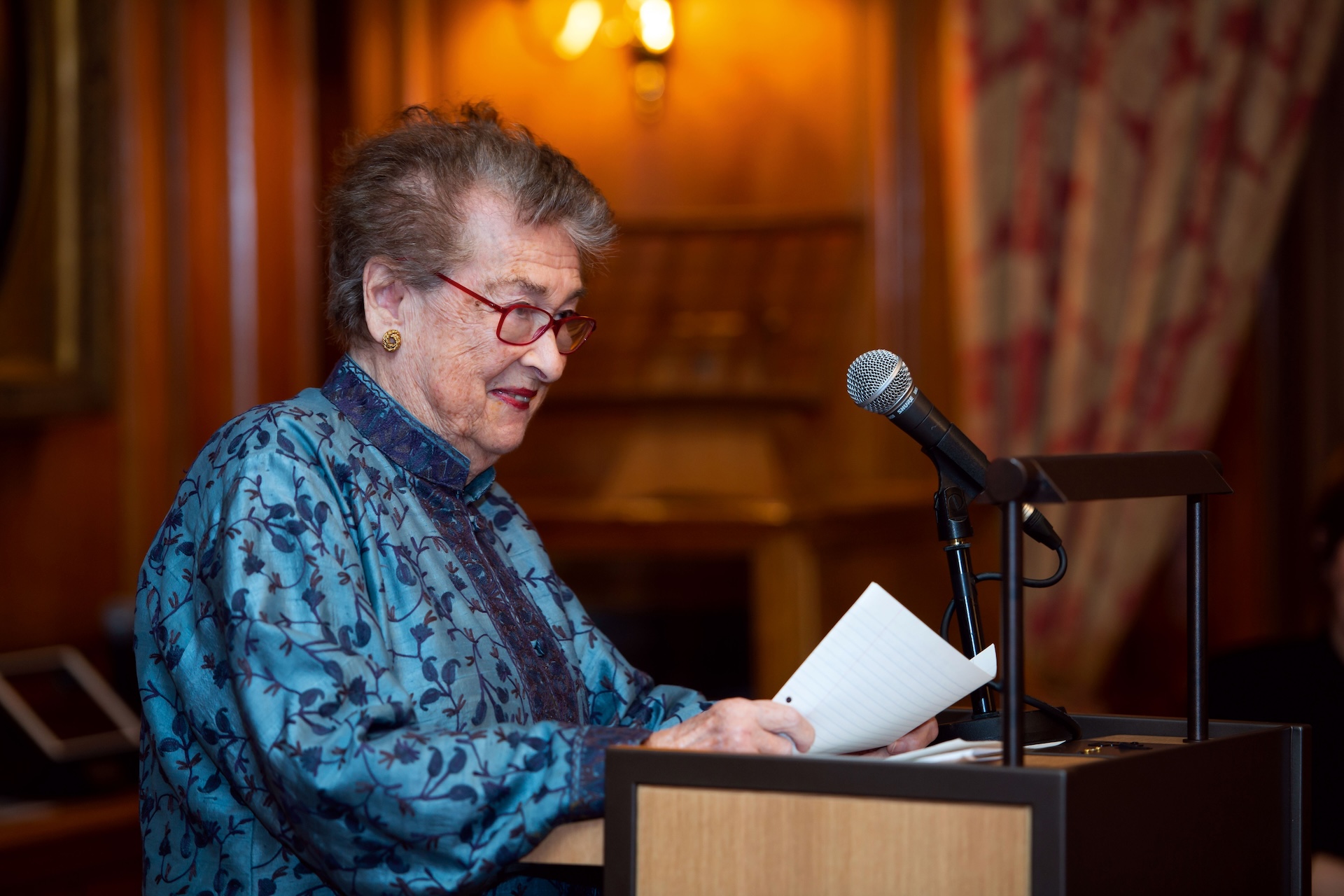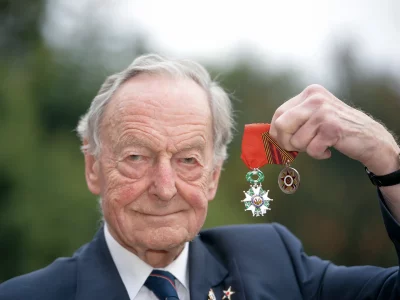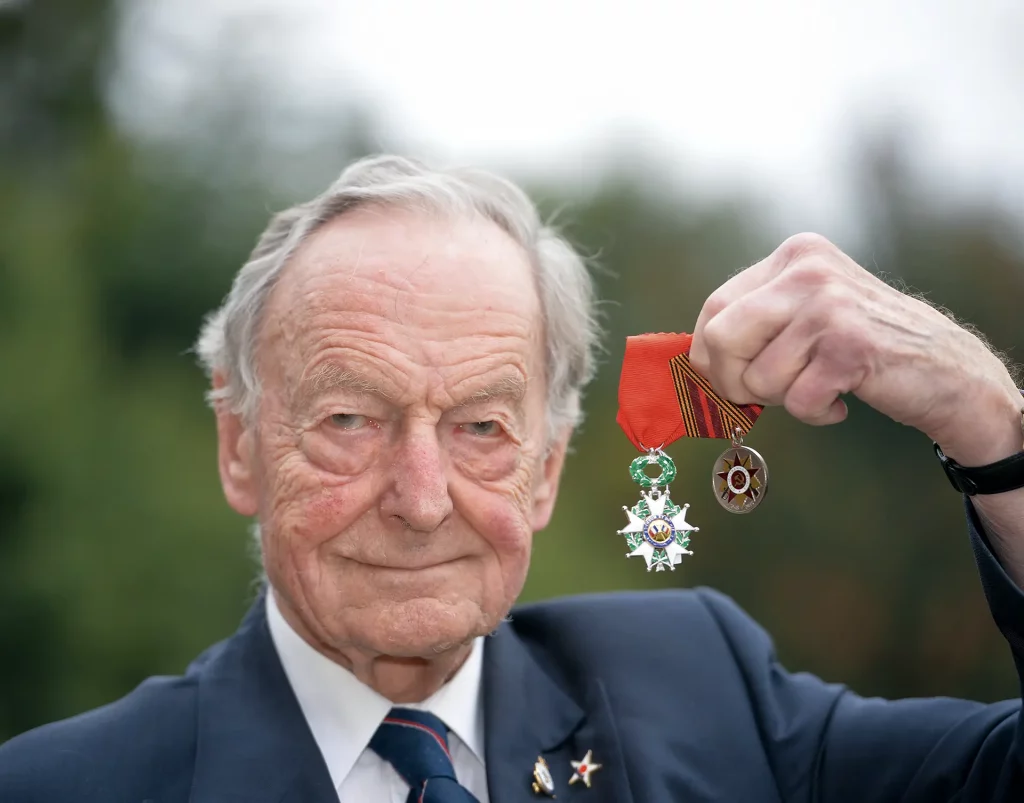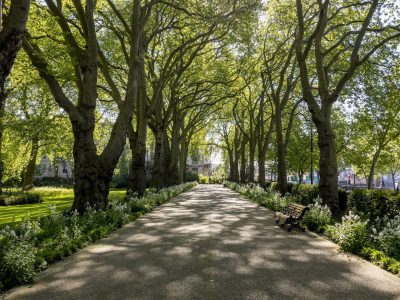

In celebration of 100 years: Master Stephen Brown
In this 80th anniversary year of the D-Day landings, and in advance of his 100th birthday, we are delighted to republish former Treasurer Master Stephen Brown’s recollections of the harrowing events of 5–6 June 1944 in which he took part as a 20 year-old British Navy Lieutenant serving with the Royal Naval Volunteer Reserve. In 1994, whilst Treasurer, he and members of his family attended the 60th anniversary commemorations. In 2015, he received France’s highest military honour the Chevalier de la Legion d’honneur for his role in the D-Day Landings.
We were right in the vanguard, ahead of everyone else. At 6:30 we opened up and the landing started an hour and a bit later. The bombardment is something I will never forget.
D-DAY LANDINGS
By Master Stephen Brown
In the early morning of the 6 June, memories of 60 years ago flooded back as the P&O Caen Express left Spithead astern bound for Ouistreham and the mouth of the River Orne. On the afternoon of the 5 June 1944 (D minus one), destroyers of the 23rd Flotilla had left Spithead leading a mighty invasion force towards Sword Beach. As HMS Scourge (my ship) and the other S’s weighed anchor, Winston Churchill passed down the line in a motor launch giving his famous V-sign and each member of the ship’s company was handed a printed message of encouragement for the great enterprise (upon which we were embarking) from General Eisenhower. We were unaware that there had been a 24-hour delay due to bad weather, but there was now no doubt that the long-awaited invasion of Europe was underway.

The evening and the night passed slowly. There was a rising sense of tension as, with the incessant and deafening noise of aircraft overhead, we followed in the wake of a minesweeper marking a channel to the Normandy shore. We were alert to look out for two midget submarines returning from the beaches where they had been observing the underwater defences. In the misty dawn and with our battle ensign flying, we ‘closed the beach’. Just ahead, the Norwegian destroyer Svenner, a member of our 23rd Destroyer Flotilla, was hit by torpedoes fired by German warships emerging from Le Havre. As she sank at 6:30am, the order came to open fire. The sight and sound of the ensuing bombardment defies description. The main fleet of battleships and cruisers lying astern of us further out from the shore unleashed a deafening barrage of fire. Landing ships equipped with rocket launchers discharged an astonishing barrage of rockets, which seemed to engulf the whole shore. Then the landings commenced. Through a nasty, uncomfortable swell, the small landing craft headed for the beach. Events moved quickly. Targets identified in advance and later by our own Forward Observation Officer ashore were engaged as we passed to and fro along the beaches. We observed the sinking of old merchant ships to act as blockships to protect the open shore and subsequently the arrival of the components to make the Mulberry Harbour.
The sight and sound of the ensuing bombardment defies description. The main fleet of battleships and cruisers lying astern of us further out from the shore unleashed a deafening barrage of fire.
In the evening (of D-Day), with the sun shining, there was a spectacular parachute drop of men and supplies. Then we were straddled by six bombs, which happily fell either side of the ship, making the open bridge very wet. Memories return of speedy visits back to Portsmouth to re-ammunition and of escorting Winston Churchill in the destroyer HMS Kelvin to Arromanches and later the King and Field Marshall Smuts in the cruiser Arethusa. Then HMS Swift, whilst preparing to come alongside us to receive ammunition, struck a mine and sank.

These and other memories of a tumultuous D-Day and of subsequent days and nights off the beaches of Normandy filled my mind as with five colleagues of the 23rd Destroyer Flotilla and some family members I went to attend a memorial service at the Naval Memorial, which the 23rd Destroyer Flotilla had been instrumental in having erected at Hermanville-sur-Mer overlooking Sword Beach. We mourned members of the crews of two of our flotilla of eight destroyers – HMS Swift and His Norwegian Majesty’s ship Svenner, both sunk off Sword. A Royal Marine band, specially flown in, played for us. National anthems were sung, the ‘Last Post’ and ‘Reveille’ were sounded and wreathes laid. The Mayor made a warm speech of welcome and Captain John Gower DSC, formerly Captain of HMS Swift and at 93 years of age, gave an address. French people made us especially welcome and thanked us. It was all very moving looking out over the sunny calm channel and a magnificent sandy beach, remembering the fighting of 60 years before. How fortunate we were to be able to return.
The Rt Hon Sir Stephen Brown GBE
Lord Justice of Appeal, 1983–88;
President of the Family Division, 1988–99
Treasurer, 2004
Chevalier, Légion d’honneur (France), 2015
